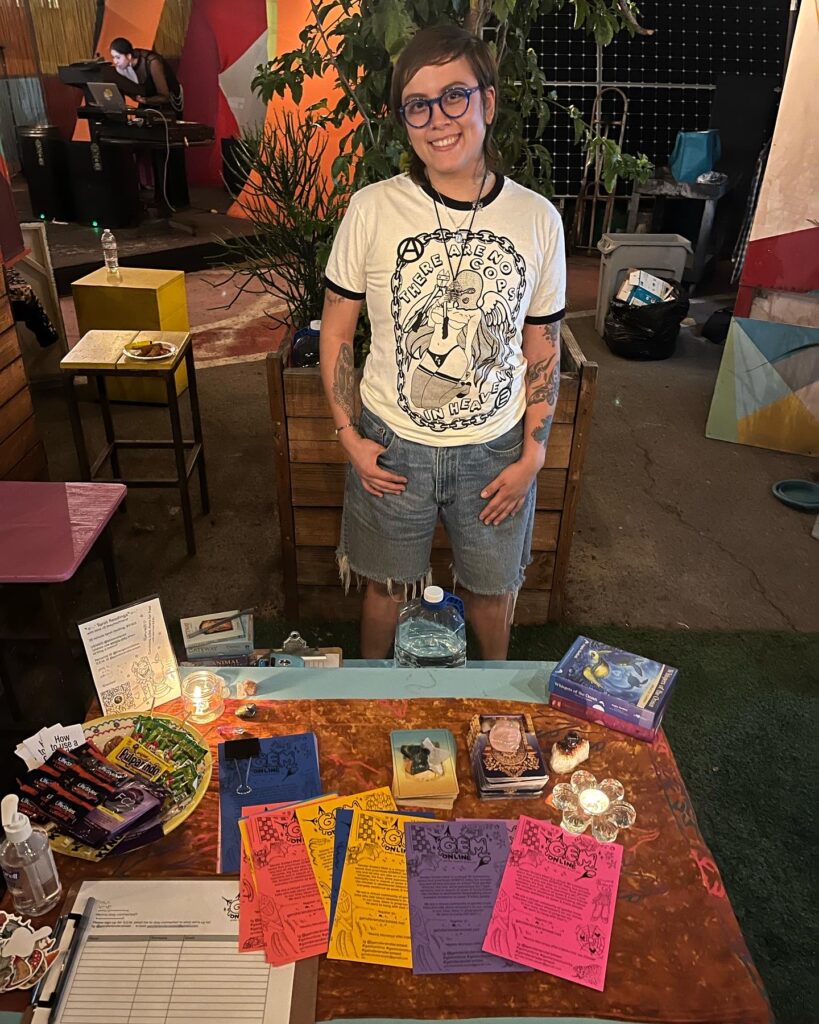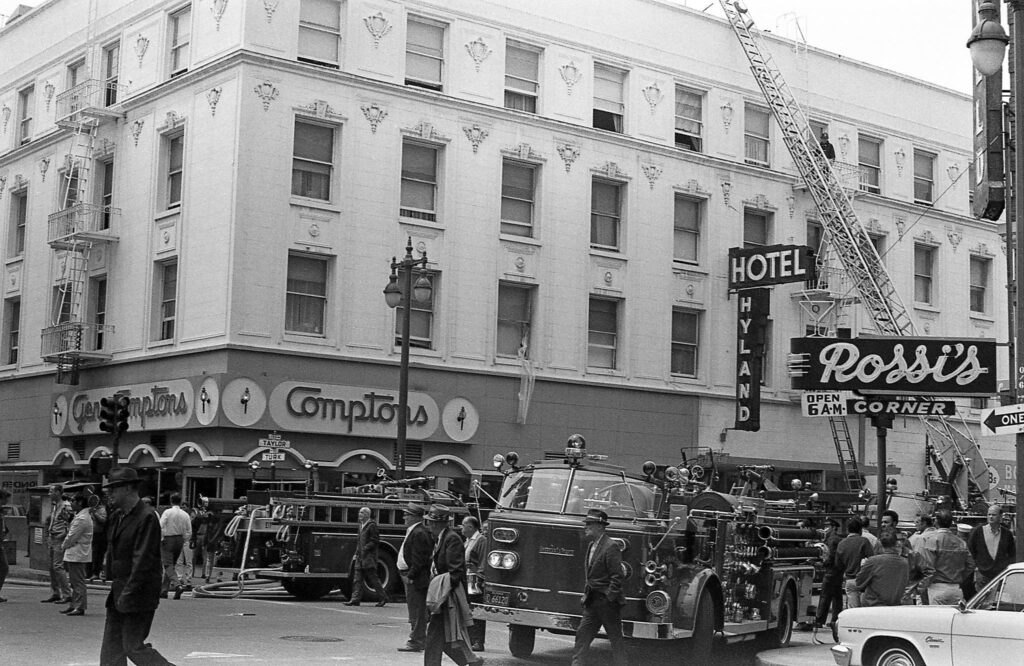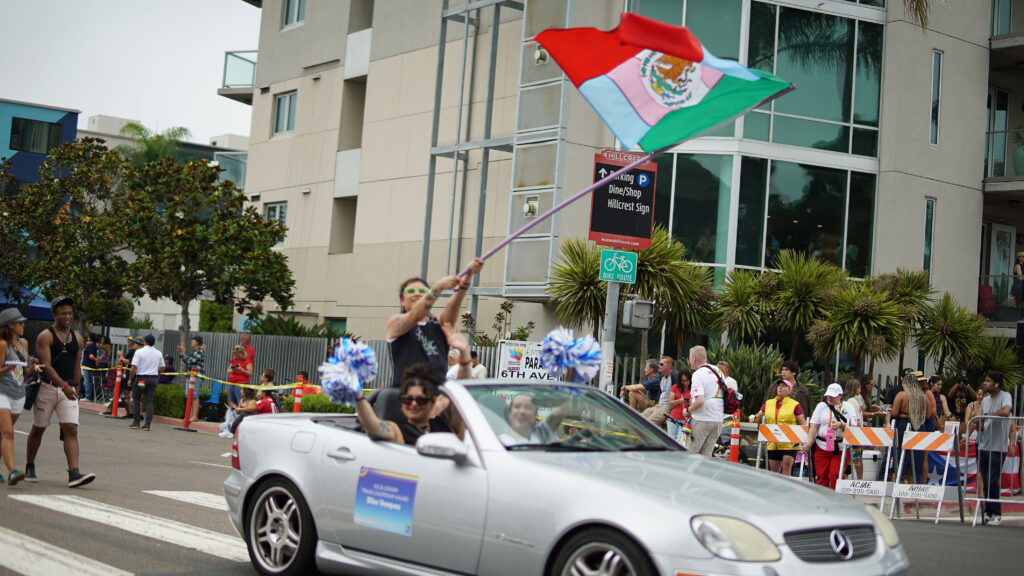Transgender History Month: Bliss Vasquez
By Cesar A. Reyes
Bliss Vasquez (they/he/elle/friend) is a community builder, organizer, and visionary whose life and work are rooted in magic, abolition, and radical care. In their own words, they are a “mixed-race, neurodivergent, gendertrash nerd.” Bliss is committed to cultivating liberatory spaces for queer and trans people, especially those often pushed to the margins. “I am a believer of magic, the power of words and intention,” Bliss says, “and an activist since before I knew that’s what I was doing.”
Bliss’s upbringing was shaped by instability and movement. Born in San Diego, they were sent at age five to live with their mother on the East Coast and raised as a military child across Kentucky, Texas, Arizona, Mississippi, and more. Constantly uprooted, Bliss learned to adapt quickly and form community wherever they landed. At 14, they were kicked out of their mother’s home. “My mom told me to ‘have a good life.’ My dad picked me up at the airport, and a new life began.”
That life included being part of the first graduating class of e3 Civic High in San Diego’s Downtown Library and later attending San Diego City College. Their first official job came through the San Diego Workforce Partnership, helping youth revise resumes and find employment—an early signal of their community-centered leadership. But Bliss’s political awakening happened even earlier. “I remember being 15 and at the corner of University and 30th for a Take Back the Night rally, dragging my then-boyfriend along with me, knowing I was part of a much larger queer world,” they recall. “I specifically remember the chant, ‘We’re feminists, don’t f*** with us!’ and knowing this is the feeling I want to invoke in my community.”

Bliss now brings that same spirit to their role at The Center as a key staff member of Project TRANS (Transgender Referrals, Assistance, Navigation, and Services). For nearly three years, Bliss and their teammate Gael (they/he) have served San Diego’s trans and nonbinary community through direct services and mutual aid. Whether helping someone call their doctor’s office, apply for EBT, or connect with affirming care, the team makes every effort count. “With little monetary resources, we make something out of nothing often,” Bliss explains. “This is why we have such a heavy emphasis on doing what we can, because we know how little there is, even in social support from those around us as trans and enby people.”
During San Diego Pride, Bliss helped organize a distribution of over 100 gender-affirming items, including packers, tucking underwear, and binders, purchased from trans-owned and local queer businesses like EnFemme and Pleasures and Treasures of Hillcrest. “Everything I do in my role, I try to imagine how we can meet the needs of our clients more and make things more accessible.”
Outside of their day job, Bliss leads Gender Enders Meet (G.E.M.), a virtual community space for BIPOC queer and gender-nonconforming adults. Founded in 2021, G.E.M. meets twice monthly via Discord and has hosted over 500 participants in its five-year lifespan. “A lot of trans and nonbinary spaces are dominated by white folks,” Bliss explains. “We try to create the space for the ‘outcasts’ of the world—coming from one themselves (me).”

G.E.M. is grounded in a radical framework called C.A.R.E.: Commitment to Abolition, Redistribution, and Eccentricity. “We believe in abolition, that we can abolish the oppressive systems like the prison industrial complex and the police. We believe in redistribution—the end of greed and individualistic mindsets. And lastly, we are reminded that we must think eccentrically. We must act different for different results.”
Much of Bliss’s organizing is informed by trans history. This August—Transgender History Month—they are especially focused on honoring the 1966 Compton’s Cafeteria Riot, a foundational moment of trans resistance in San Francisco’s Tenderloin that predates Stonewall by nearly three years. “I first learned of this history after I had transferred from City College to UCSD,” Bliss shares. “I was amazed that I was able to watch this history told by some of its participants.” They’ve since screened Screaming Queens, the Susan Stryker-directed documentary on Compton’s, with The Center’s Trans Elder Network (T.E.N.), creating intergenerational spaces of learning and connection.

This year, Bliss was honored as the first recipient of the Spirit of Stonewall Julia Legaspi Award, named after a fierce local trans activist. “As a nonbinary, self-identified gendertrash, there is often an expectation for trans to equal a binary sex or gender,” Bliss says. “I’m grateful to be seen as the genderqueer trans person I am. Receiving this award feels like an affirmation to keep doing what I’m doing and leaning into not just my dreams, but our dreams as a collective to be free.”
When asked about the importance of safe spaces, Bliss is clear: “A lot of spaces, whether queer or not, are already dominated by the white supremacist culture we live in. That’s why we must keep organizing our space. We must keep meeting, dreaming, and talking, because we’re not going to discover the solutions if we’re not actively interacting with the parts of our brains and hearts that can imagine what it looks like outside of this current social hellscape.”

To LGBTQ+ youth, Bliss offers unwavering encouragement: “There are adults who will respect you. There are other youth that will embrace you. And you are never alone.” They recall their own youth, looking to the sky and asking for a sign. “Life is hard a lot for us, but there is always beauty and things to be grateful for. We’re allowed to be sad and dwell, but we can’t let it be everything.”
Looking ahead, Bliss hopes for a future filled with deeper acceptance of all forms of difference. “Whether ability, gender, body type, skin color—we need to stop thinking in prescriptive terms like, ‘Oh you’re this? You should act like that.’ Instead, ask:
‘Can you share with me who you are?’”

